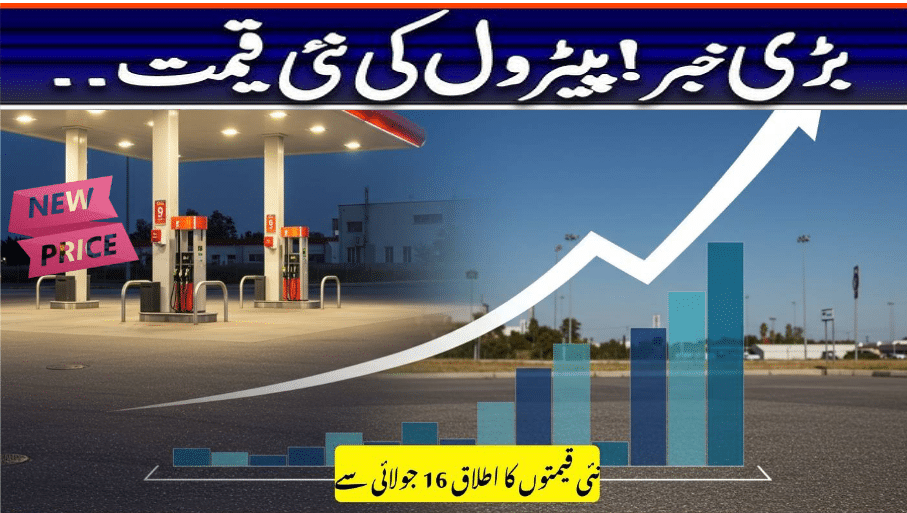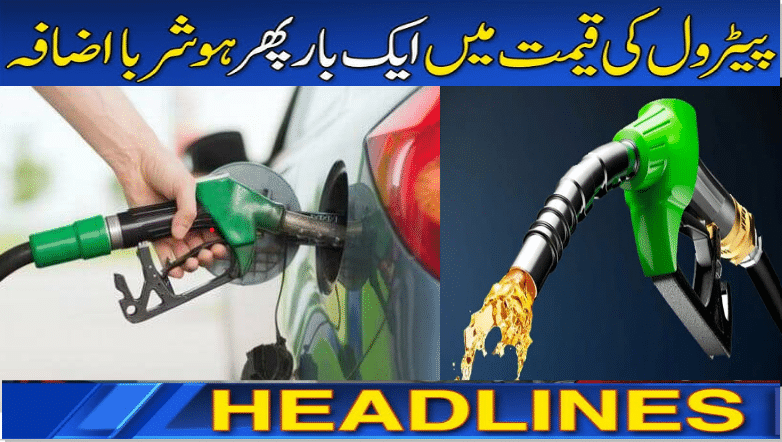Diesel Petrol Prices Increased Again – 16 July 2025 Updated. Petrol at Rs272.15, diesel at Rs284.37. See updated rates and tax breakdown.
The diesel petrol prices in Pakistan have been revised once again as of July 16, 2025. This latest hike, officially announced by the Ministry of Finance, reflects the fortnightly fuel price adjustment mechanism overseen by the Oil and Gas Regulatory Authority (OGRA). The adjustments impact fuel costs for both private consumers and commercial sectors across Pakistan.
According to a notification issued by the Finance Division, these revised prices are effective from Tuesday, July 16, and will remain applicable until the next scheduled review at the end of the fortnight. This update is based on international oil trends, import costs, exchange rate fluctuations, and the prevailing tax structure.

New Fuel Prices in Pakistan (Effective July 16, 2025)
The latest fuel price increase is as follows:
| Fuel Type | Old Price (PKR/Litre) | New Price (PKR/Litre) | Change |
| Petrol | Rs266.79 | Rs272.15 | +Rs5.36 |
| High-Speed Diesel (HSD) | Rs273.00 | Rs284.37 | +Rs11.37 |
| Kerosene Oil | No Change | No Change | Rs0.00 |
| Light Diesel Oil (LDO) | No Change | No Change | Rs0.00 |
The most significant increase has been recorded in High-Speed Diesel, up by Rs11.37 per litre. Petrol has risen by Rs5.36 per litre, while kerosene and light diesel oil remain unchanged in this pricing cycle.
Economic Impact of Fuel Price Hikes on Daily Life
The upward revision in diesel petrol prices in Pakistan is likely to cause a cascading effect across various sectors. Petrol is the primary fuel for motorcycles, rickshaws, and private vehicles, which makes even a small increase impactful for daily commuters and middle-class families.
High-Speed Diesel is heavily used in commercial transportation, agricultural machinery, and freight logistics. With a double-digit increase in its price, essential goods transported across provinces—such as vegetables, fruits, grains, and household items—may witness increased retail prices.
Key sectors affected by fuel price inflation include:
- Public Transport: Operators of buses and vans may revise fares upward.
- Agriculture: Diesel-fueled tractors and water pumps will cost more to run, particularly during the summer harvesting season.
- Freight and Logistics: Transportation costs for FMCG and industrial materials are expected to rise.
Why Are Diesel Petrol Prices Increasing in Pakistan?
Fuel prices in Pakistan are determined by a number of interconnected global and local factors. The fortnightly review process is based on OGRA’s recommendation, which assesses the following elements:
- Global Crude Oil Prices: Recent fluctuations in the Brent crude oil market have had a direct impact on import parity pricing.
- Exchange Rate Volatility: The depreciation of the Pakistani rupee against the US dollar increases the cost of oil imports.
- Government Levies and Duties: Even with zero General Sales Tax (GST), various other taxes significantly raise the final retail price of fuel.
As per the Finance Division’s breakdown, the per-litre price of petrol and diesel includes:
- Petroleum Development Levy (PDL):
- Rs78.02 for Petrol
- Rs77.01 for Diesel
- Climate Support Levy (CSL): Rs2.25 per litre
- Customs Duty: Rs20–21 per litre
- Dealer & Distributor Margins: Approximately Rs17 per litre
Total Tax Load Per Litre: Nearly Rs98 per litre is collected in the form of levies, duties, and profit margins—constituting a significant portion of the pump price.
Petroleum Levies: A Critical Revenue Stream for Pakistan
Despite no GST on petroleum products, fuel remains a vital revenue-generating asset for the federal government. In fiscal year 2023–24, the government reportedly collected Rs1.161 trillion through petroleum development levies alone.
For the ongoing fiscal year 2024–25, the revenue target from petroleum levies has been increased to Rs1.470 trillion, reflecting a 27% year-on-year growth.
These funds are earmarked for budgetary support, including subsidies, development projects, and debt servicing. However, they also place an additional financial burden on end-users during a time of high inflation and stagnant wage growth.
Breakdown of Fuel Price Calculation in Pakistan
The Oil and Gas Regulatory Authority provides a cost-based calculation model that incorporates:
- Import Parity Price (IPP) based on Platts oil prices
- Freight charges and premium paid to global suppliers
- Exchange rate adjustments
- Storage and inland freight equalization margins
- Taxation & dealer margins
This formula allows OGRA to propose fortnightly revisions to the Ministry of Energy (Petroleum Division), which finalizes the retail prices in consultation with the Finance Ministry.
While these mechanisms are intended to keep domestic fuel pricing in line with international benchmarks, the persistent devaluation of the rupee and high global crude prices contribute to domestic price hikes.
Fuel Price Volatility and Its Broader Economic Effects
Fuel prices are a key input cost across the economy. Increases in diesel and petrol prices can lead to:
- Cost-Push Inflation: As businesses incur higher transport and production costs, they may pass these on to consumers.
- Reduced Consumer Spending: Households may cut discretionary spending to accommodate increased fuel and transportation expenses.
- Supply Chain Strain: Industries relying on timely delivery of goods may face cost overruns and margin pressure.
- Agricultural Costs: Rural communities depending on diesel-powered machinery may experience financial strain, especially in high-consumption periods.
Economists have emphasized the multiplier effect of fuel price hikes, where one increase in cost leads to subsequent hikes in multiple goods and services, potentially driving inflation across all consumer segments.
Comparison with Regional Fuel Prices – Diesel Petrol Prices Increased Again – 16 July 2025 Updated
When compared with regional economies, Pakistan’s fuel prices remain high relative to average household incomes. Below is a comparative analysis as of mid-July 2025:
| Country | Petrol Price (PKR Equivalent) | Diesel Price (PKR Equivalent) |
| India | ~Rs245 | ~Rs230 |
| Bangladesh | ~Rs200 | ~Rs210 |
| Pakistan | Rs272.15 | Rs284.37 |
| Sri Lanka | ~Rs218 | ~Rs225 |
This comparison highlights the pressure on Pakistani consumers, especially given the disparities in per capita income and fuel subsidies across the region.
Future Outlook for Fuel Prices in Pakistan
The next fuel price review is expected at the end of July 2025. Price fluctuations in the international market and any changes in the exchange rate will influence the direction of the next adjustment.
Meanwhile, the federal government has indicated no immediate plans to reintroduce GST on petroleum, but continues to rely on petroleum levies for budgetary support. Any changes in global oil supply chains, such as production cuts by OPEC+ or disruptions in maritime trade, could further impact future price announcements.
Market analysts are closely watching for:
- International Brent crude movements
- Exchange rate trends
- Domestic policy adjustments on subsidies and levies
Tips for Consumers During High Fuel Prices
In light of rising diesel and petrol prices, consumers and businesses are encouraged to:
- Optimize fuel usage by avoiding unnecessary trips and using fuel-efficient routes.
- Consider carpooling or public transportation where feasible.
- Service vehicles regularly to maintain engine efficiency.
- Monitor fortnightly OGRA updates for price changes.
Additionally, transport sector workers and freight operators are advised to account for changing operational costs in their financial planning.
Diesel Petrol Prices Increased Again – 16 July 2025 Updated | Conclusion, Impact & Latest Fuel Rates in Pakistan
The recent hike in diesel and petrol prices in Pakistan, effective from 16 July 2025, underscores the ongoing volatility in global energy markets and its domestic implications. With petrol up by Rs5.36 and diesel rising by Rs11.37 per litre, households and businesses alike face increased financial pressure.
As Pakistan continues to balance fiscal needs with inflation control, fuel pricing remains a delicate and closely watched subject. Consumers are advised to stay informed through official channels such as OGRA notifications and Finance Division statements.
For now, fuel remains both an essential commodity and a significant component of national revenue generation.
Punjab Assembly Restores 26 Suspended Lawmakershttps://regilia.com/punjab-assembly-restores-26-suspended-lawmakers/

